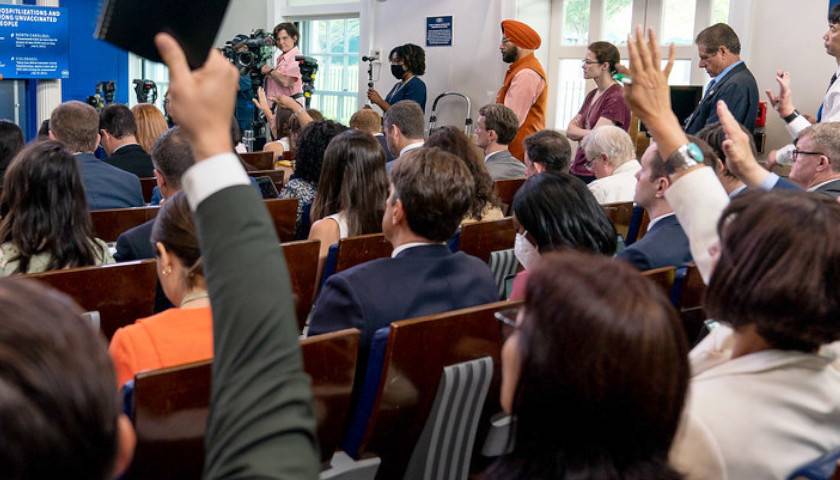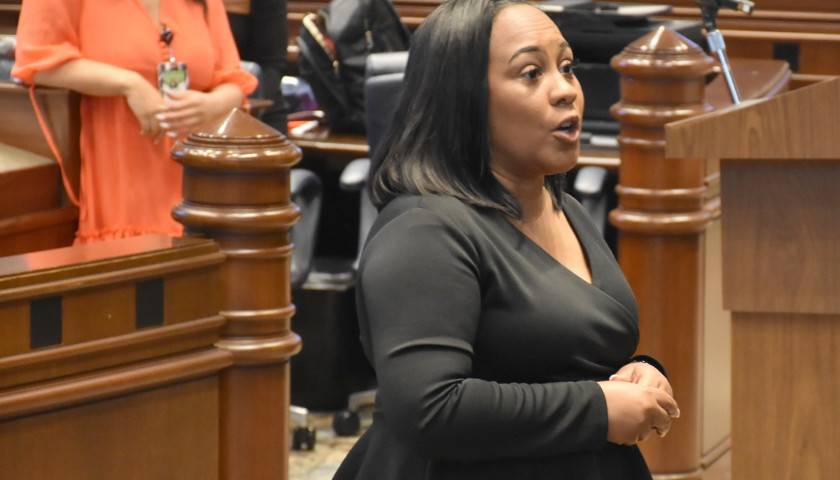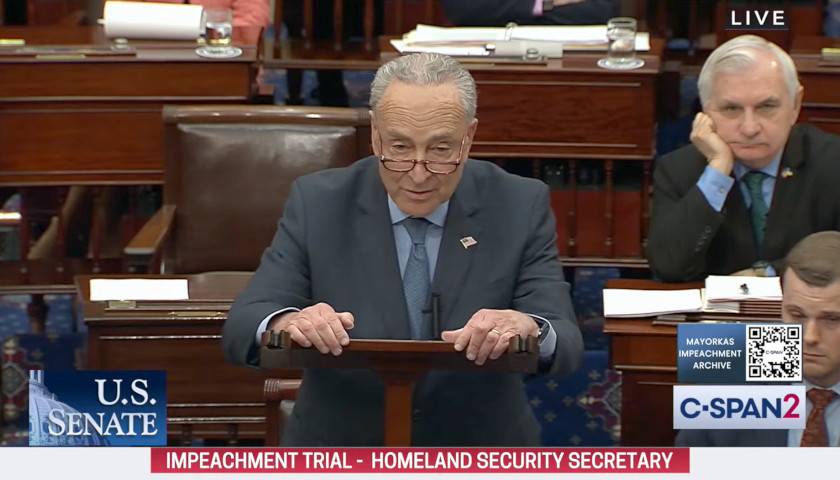by Greg Piper
President Joe Biden’s administration is getting some big-name allies as it defends against a landmark free speech infringement lawsuit. Their argument: protecting Americans from indirect censorship by government officials undermines the First Amendment, national security, and public health.
Advocacy groups for journalists, academics, doctors, technologists, and big business, and a powerful senator, made various forms of these arguments in friend-of-the-court briefs to the Supreme Court in the days before and after Christmas.
The justices are evaluating the broad view of “state action” adopted by the 5th U.S. Circuit Court of Appeals, which found that the White House, surgeon general, CDC, FBI, and Cybersecurity and Infrastructure Security Agency likely violated the First Amendment by pressuring and cajoling tech platforms to suppress disfavored narratives.
The high court already gave the feds two intermediate victories, most recently rejecting a request to intervene in the case by a repeat target of censorship, independent presidential candidate and COVID-19 vaccine skeptic Robert F. Kennedy Jr.
A majority also suspended a lower court’s injunction against coercive communications from the feds to platforms. Justices Samuel Alito, Clarence Thomas and Neil Gorsuch warned in a dissent that the public would see the action as “giving the Government a green light to use heavy-handed tactics to skew the presentation of views” on social media.
DHS and CISA have been sidestepping the Constitution to enact their censorship laundering schemes against Americans.
Government censorship, even by proxy, is wrong and unconstitutional.
My full opening statement: pic.twitter.com/o4v80aJG9u
— Rep. Dan Bishop (@RepDanBishop) December 13, 2023
While disputing the legal standing of the plaintiffs, the Biden administration’s brief insists that officials at most “state[d] their views in strong terms” that may have led “private actors [to] change their speech or conduct” — government speech that “poses no First Amendment concern.”
Solicitor General Elizabeth Prelogar quickly invoked the threats of terrorism, “[c]hild predators,” and Russian disinformation on social media. The feds are simply pointing platforms to content that violates their own content-moderation policies but can’t stop them from changing those policies, as did Twitter after Elon Musk’s purchase, she said.
Senate Intelligence Committee Chairman Mark Warner, D-Va., “considers it a national security imperative for government officials to engage with social media platforms about foreign malign influence targeting their users, particularly in the context of election influence and efforts to stoke social and racial tensions in the United States,” Warner’s brief argued.
“Real-time private engagement between frontline government officials and social media companies is now effectively impossible” even with the justices suspending the injunction by U.S. District Judge Terry Doughty, the senator alleged.
Even if the injunction allowed “public threat announcements” for platforms to consider, “it is clear they would imperil U.S. intelligence sources” and “give advance notice to foreign adversaries about how the U.S. identified their campaigns,” Warner said.
The Reporters Committee for Freedom of the Press’s brief said the 5th Circuit “relied on considerations that could just as well characterize routine interactions between the government and the Fourth Estate” and endanger the media’s editorial discretion.
‼️ .@RepMarkGreen & @RepDanBishop uncover new evidence of DHS, Big Tech collaborating to censor Americans: https://t.co/cCQHpQzWKT pic.twitter.com/fJT9yojZYO
— House Homeland GOP (@HomelandGOP) November 6, 2023
“A hair-trigger standard [for ‘illicit coercion’] would chill the ordinary and necessary flow of information from government sources, both official and off the record, to the news media,” the brief stated. It could also encourage “burdensome fishing expeditions” by plaintiffs such as Kennedy to find purported collusion between journalists and public officials.
The justices should adopt a “totality-of-the-circumstances test for unconstitutional government jawboning,” the Knight First Amendment Institute at Columbia University’s brief says, using the example of President Biden’s accusation that social media companies were “killing people” by insufficiently censoring purported COVID vaccine misinformation.
While “the word choice was provocative” and Biden could “direct his administration to retaliate for noncompliance,” the statement didn’t threaten “adverse consequences” and could be seen as “an effort to persuade the public of the moral culpability of the platforms,” the brief argued.
Medical groups including the American Academy of Pediatrics and American Medical Association told the justices the government could easily demonstrate the “compelling interest” requirement for constitutional muster under the “strict scrutiny” standard Doughty used.
“It is an indisputable scientific fact that vaccinations save lives,” and “combatting vaccine misinformation is, at its simplest, the government trying to prevent factually incorrect statements from costing people their lives,” their brief stated. It cites research that purportedly finds that vaccination substantially reduces the transmissibility of COVID.
The brief by the Electronic Frontier Foundation and Center for Democracy and Technology may be the most nuanced among filers, emphasizing both the “often fuzzy” distinction between proper and improper communication and the real threat of censorship.
“Courts must be especially protective of users’ rights because users cannot depend on the intermediaries,” most of whom “have few incentives to publish users’ speech in the face of even mild government pressure to censor it,” the brief said.
In “close cases,” courts should rule against the government so it has incentives to phrase communications as “merely informative or persuasive […] and with a keen awareness of its inherent coercive power and potential for intimidation,” the filing argued. Because government speech “tends to be quite hearty and politically motivated,” it’s less likely to suffer a “chilling effect.”
An expansive view of state action imperils academic research, according to briefs by Stanford University, whose Stanford Internet Observatory (SIO) played a crucial role in alleged collusion between the feds and platforms, and the Coalition for Independent Technology Research.
Even as it accuses both the plaintiffs and Judge Doughty of repeated factual errors about SIO’s work with the Election Integrity Partnership and Virality Project, Stanford’s brief also creates factual confusion for the justices. Doughty “stated that EIP had flagged 22 million tweets when the real number was roughly 0.01% of that,” the brief stated.
But EIP’s own after-action report mentions 22 million tweets that shared 4,800 flagged URLs.
Research on “the political and social effects of digital technologies […] frequently depends on the willingness of government officials to share information with researchers,” but the 5th Circuit’s ruling has “chilled government officials and technology companies from engaging in routine interactions with them” to avoid “any even arguable violation” of the suspended injunction, CITR’s brief said.
The U.S. Chamber of Commerce’s brief urges the high court to ignore the “misfit” state-action framework adopted by the lower courts, which would penalize companies “for actions they were coerced to take.”
“If plaintiffs are correct that the government here improperly pressured private companies into restricting content, then the companies’ own right of editorial discretion has already been violated and they are in fact victims, not perpetrators, of unconstitutional government overreach,” the Chamber argued.
– – –
Greg Piper has covered law and policy for nearly two decades, with a focus on tech companies, civil liberties and higher education.






